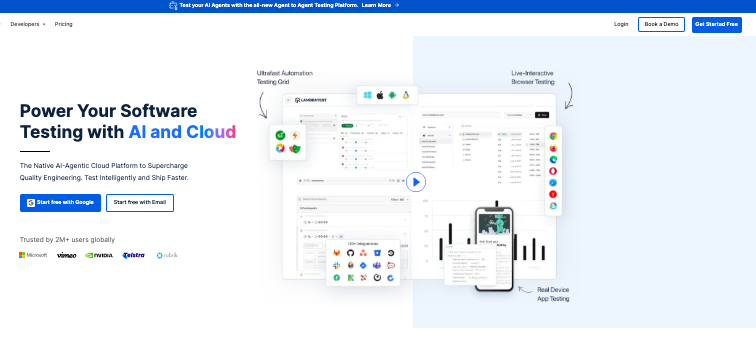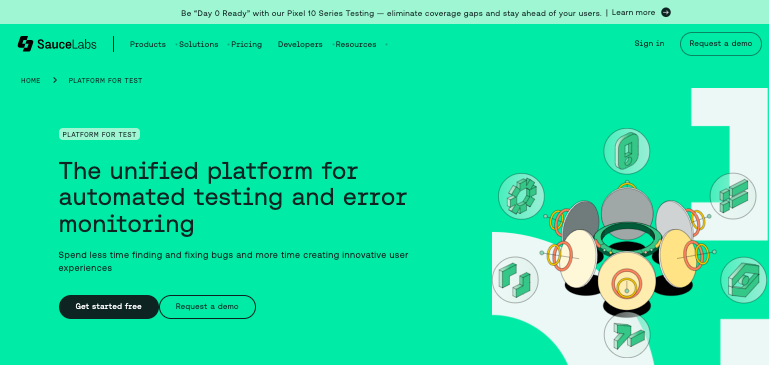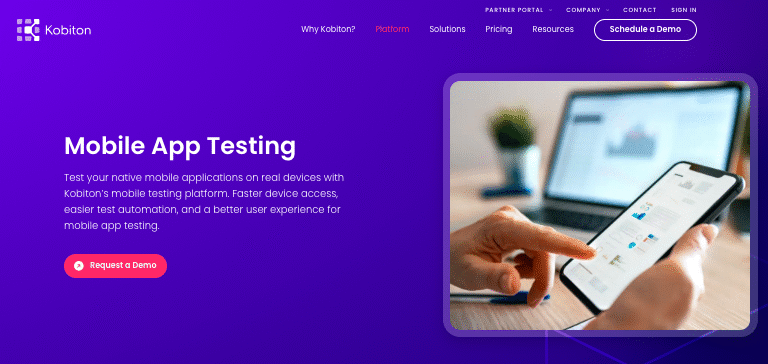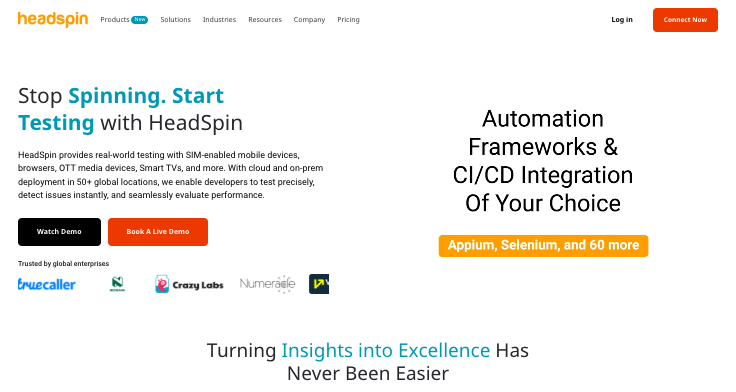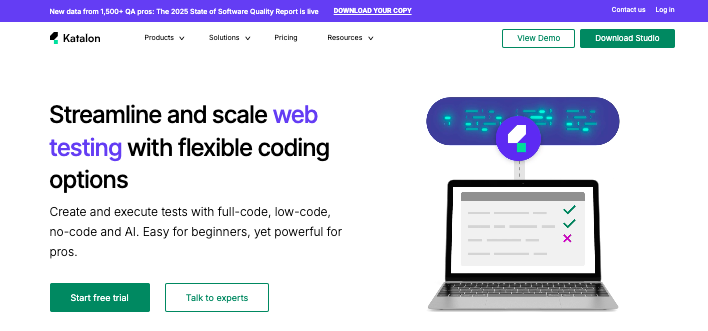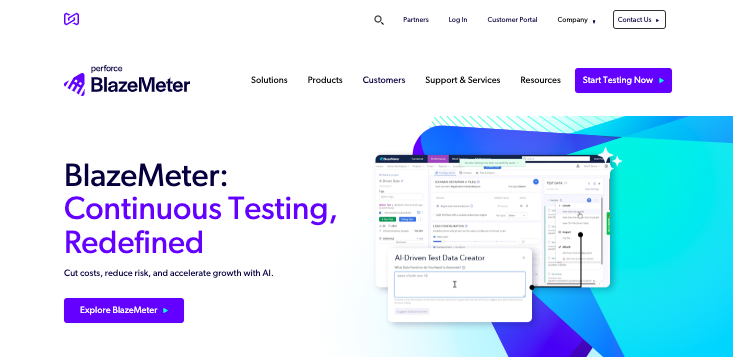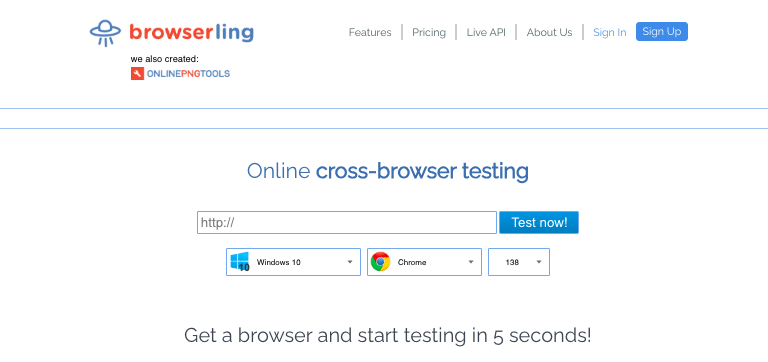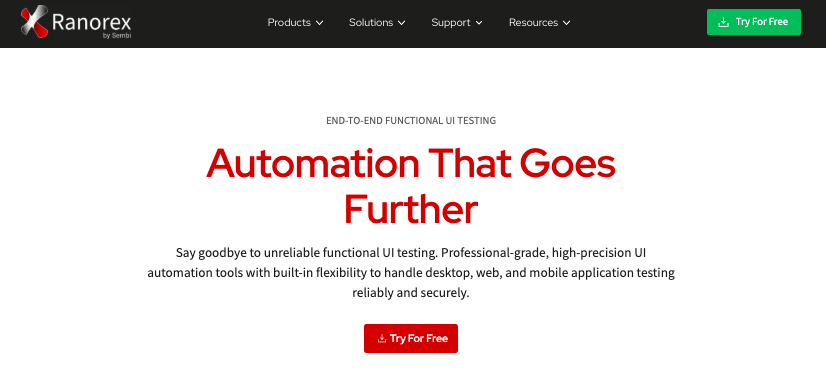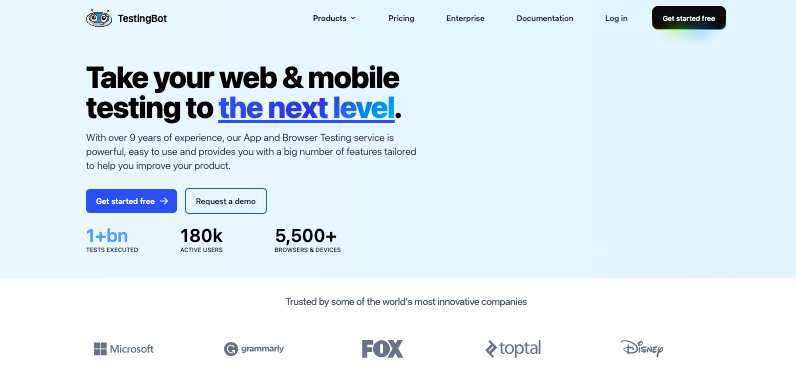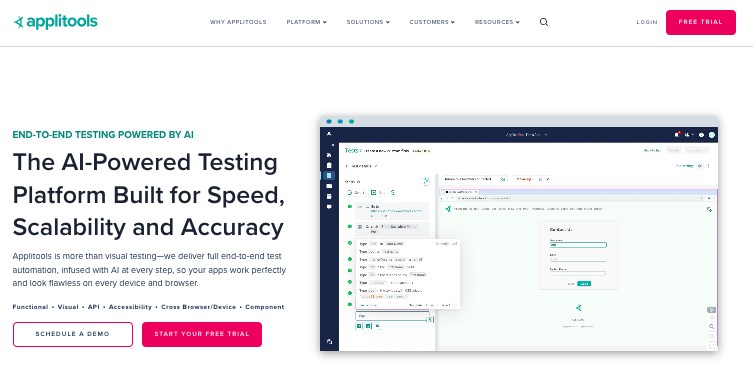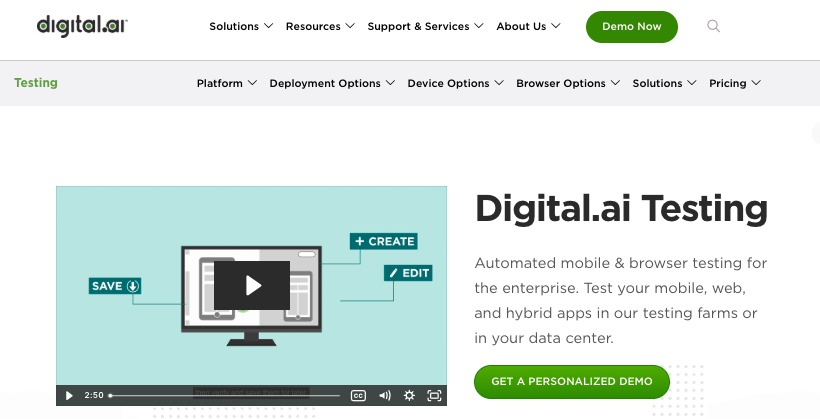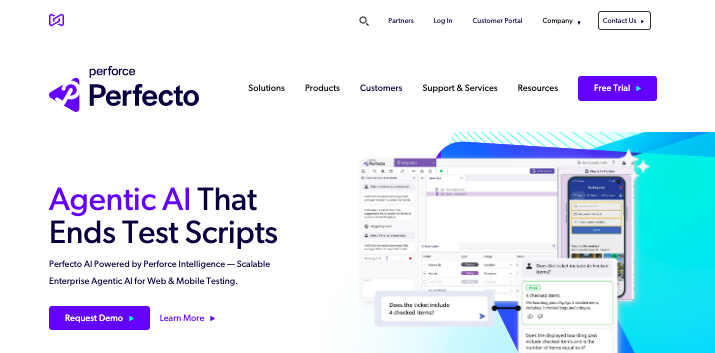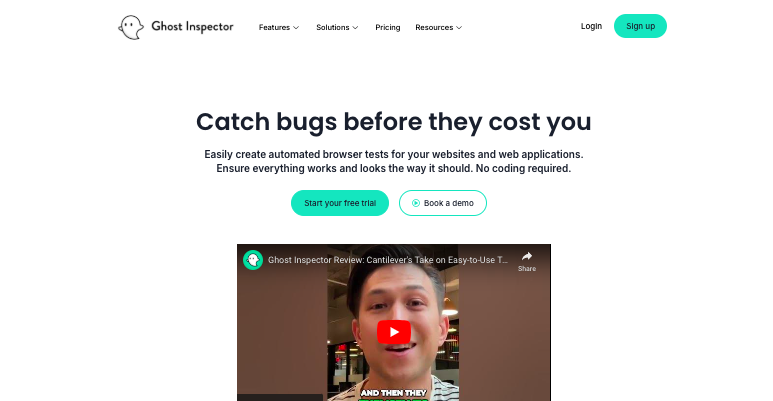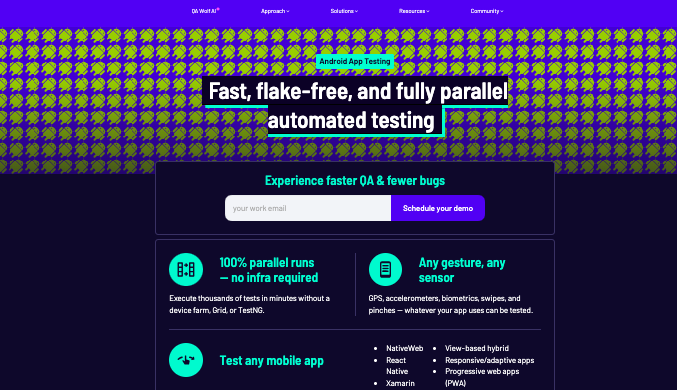BrowserStack is a cross-platform browser and app testing tool that uses real devices (not emulators and simulators).
It provides a network of real machines to visit your website or app on various live browsers. You’ll be able to see how your website or app shows up on different devices and browsers, such as Chrome on Linux, Firefox on Windows Vista, or an iPhone.
However, many users complain that BrowserStack’s service is rather slow, even if it encompasses a large network of different device types. Also, it’s not free to use.
In this guide, I will review the best paid and free BrowserStack alternatives. Regardless of what you are testing, these alternatives will help you test and improve your website or app.
Let us get into it.
Testing your websites and applications on latest Android & iOS mobile browsers is simpler than ever. LambdaTest allows locally hosted & geo location testing, along with debugging, collaboration & more. Try it today!
Why Run Cross-Browser Tests?
When you release a website or mobile application, you must ensure it shows up correctly on all devices. Some people will use Android devices to access it, others will use Safari on a Mac, and others will use Internet Explorer on Windows 7.
Sometimes, the same person will access the website or application from multiple platforms. For example, they may visit your store on their mobile phone but later complete their purchase on their desktop machine.
Take a service like Netflix as a better example. Depending on their location, some people will view it on their phones and laptops at different times.
It’s impossible to test your application or website on all devices fully. Not only is every computer type different, but every browser has multiple versions, some having dozens of versions.
In addition, there are many mobile phones, and not all Android or iOS phones are the same. Certain errors may only appear on some devices.
That’s why cross-browser testing services are so useful.
They allow you to run multiple tests on thousands of device and browser configurations to uncover all errors.
Testing your websites and applications on latest Android & iOS mobile browsers is simpler than ever. LambdaTest allows locally hosted & geo location testing, along with debugging, collaboration & more. Try it today!
Also Read: Best Open-source Tools For Web Developers
Best BrowserStack Alternatives (Free & Paid)
1. LambdaTest
LambdaTest is a cloud-based platform designed for both manual and automated cross-browser testing.
It supports over 3,000 browser, device, and OS combinations, ensuring thorough coverage for developers.
The platform integrates easily with CI/CD pipelines like Jenkins, CircleCI, and GitHub Actions, making it a seamless part of modern development workflows.
One of its standout features is smart testing with AI-powered insights and visual regression testing, which helps identify UI changes quickly.
LambdaTest also offers a scalable grid for Selenium, Cypress, and Playwright testing, appealing to automation-heavy teams.
Its real-time testing environment is intuitive, allowing developers to debug issues with tools like video recordings, screenshots, and logs.
The pricing structure is more flexible than some competitors, making it attractive for startups and mid-sized businesses.
Its customer support and user-friendly interface are frequently praised by users. For teams looking for an affordable yet feature-rich BrowserStack alternative, LambdaTest is an excellent option.
Testing your websites and applications on latest Android & iOS mobile browsers is simpler than ever. LambdaTest allows locally hosted & geo location testing, along with debugging, collaboration & more. Try it today!
2. Sauce Labs
Sauce Labs is one of the strongest competitors to BrowserStack, offering a robust cloud-based platform for automated and live testing.
It provides access to thousands of browser and device combinations, making it easy to test web and mobile apps in real-world conditions.
With its strong integration capabilities, it works well with popular CI/CD tools, ensuring smoother workflows for developers.
Sauce Labs also emphasizes reliability, with enterprise-grade security and compliance certifications that appeal to larger organizations.
One standout feature is its analytics and debugging tools, which provide detailed test reports and insights. The platform supports Selenium, Appium, Cypress, and other frameworks, giving teams flexibility in how they run their tests.
For enterprises with large testing needs, its scalability makes it a go-to choice. Its pricing, while not the cheapest, is justified by the range of features and enterprise-level support.
Sauce Labs is ideal for teams that want a stable, comprehensive, and future-proof testing solution.
3. Kobiton
Kobiton specializes in mobile device testing, setting it apart from many competitors. It provides access to a cloud of real Android and iOS devices as well as options for on-premise device labs.
With Kobiton, teams can run both manual and automated tests, ensuring mobile apps work flawlessly across different environments.
It integrates with testing frameworks like Appium, Espresso, and XCUITest, making it versatile for QA engineers. A unique feature of Kobiton is its AI-driven scriptless automation, which accelerates the creation and execution of test cases.
It also supports performance monitoring, providing insights into app responsiveness and usability. Kobiton’s detailed logs, screenshots, and videos make debugging much easier.
The platform is well-suited for organizations that prioritize mobile-first experiences.
Check out the latest pricing here.
4. HeadSpin
HeadSpin is a high-end platform designed for testing, monitoring, and optimizing digital experiences.
Unlike many competitors, it emphasizes performance insights alongside functional testing. It provides global device infrastructure, enabling testing on real devices across different geographies.
HeadSpin supports web, mobile, audio, and video testing, making it versatile for diverse applications. Its AI-powered analytics deliver deep insights into user experience, network conditions, and app performance.
This helps teams not only find bugs but also improve the overall quality of their products. HeadSpin integrates with popular automation frameworks and CI/CD tools, ensuring streamlined workflows.
The platform is particularly strong for enterprises that operate on a global scale and need real-time performance data.
While it comes at a higher price point, the depth of analytics and coverage justifies the investment.
5. Katalon
Katalon is a comprehensive testing solution that combines ease of use with advanced automation capabilities.
It offers web, API, mobile, and desktop testing all in one platform, which makes it appealing to teams that want a unified solution.
Katalon supports popular frameworks like Selenium and Appium but adds a user-friendly layer with its no-code and low-code options.
Its built-in analytics and reporting tools make it easier for teams to track test progress and outcomes. The platform integrates with CI/CD tools such as Jenkins, Azure DevOps, and GitLab, ensuring compatibility with modern workflows.
Katalon also has a strong community and marketplace where users can find reusable plugins and extensions.
One advantage is its affordability, offering a free version alongside paid plans with advanced features.
For teams seeking a flexible, all-in-one alternative to BrowserStack, Katalon stands out. It’s especially beneficial for organizations with mixed testing needs beyond just browsers.
Check pricing and plans here.
6. BlazeMeter
BlazeMeter is best known for its performance and load testing capabilities.
Acquired by Perforce, it allows teams to simulate millions of virtual users to test how applications perform under stress.
Unlike BrowserStack, which is focused mainly on functional and compatibility testing, BlazeMeter is designed to ensure applications scale and remain reliable.
It supports open-source frameworks like JMeter, Gatling, and Selenium, making it versatile for developers. BlazeMeter also provides real-time analytics, helping teams identify bottlenecks and performance issues quickly.
Its CI/CD integrations allow teams to incorporate load testing into their pipelines with ease. Another highlight is its ability to test APIs, ensuring backend services can handle expected traffic.
While it may not cover every browser and device combination like BrowserStack, BlazeMeter excels in its niche.
Check the pricing here.
7. Browserling
Browserling is a lightweight and straightforward tool for live cross-browser testing.
Unlike larger platforms, it focuses on simplicity and speed, offering quick access to popular browsers without complex setup.
Users can test websites in real time with interactive sessions, which is helpful for quick checks. Browserling doesn’t overwhelm users with too many features, making it suitable for small teams or freelancers.
Security is a key focus, with encrypted connections and no data sharing. Its pricing is much more affordable compared to enterprise-level solutions, making it attractive for budget-conscious users.
While it lacks advanced automation capabilities, its strength lies in fast, manual testing for quick debugging.
Browserling also runs everything in the browser, requiring no installation, which adds to its convenience.
8. Functionize
Functionize takes a modern approach to testing by leveraging AI and machine learning.
Its platform allows for cloud-based functional testing with a strong emphasis on automation. One of its key benefits is codeless testing, enabling non-technical team members to create and manage test cases easily.
Functionize supports cross-browser and device testing but stands out with its AI-driven self-healing tests, which adapt to application changes without constant maintenance.
This reduces the overhead for QA teams significantly. The platform integrates with CI/CD tools and offers detailed reporting dashboards for better visibility.
Functionize also focuses on scalability, supporting enterprise-level workloads. Its AI-powered engine helps reduce flaky tests and improves accuracy over time.
Check pricing here.
9. Ranorex Studio
Ranorex Studio is a full-featured test automation tool for web, desktop, and mobile applications.
It combines a user-friendly interface with advanced automation scripting, catering to both beginners and experienced testers.
Ranorex supports cross-browser testing and integrates with Selenium, which enhances its flexibility. It also includes built-in reporting and debugging tools to make test results more actionable.
Teams can integrate Ranorex with CI/CD pipelines, making it compatible with agile workflows.
A major advantage is its object recognition technology, which ensures stable tests even when UI elements change.
Ranorex also allows codeless automation, enabling less technical team members to contribute. Its licensing can be expensive, but the depth of features justifies the investment for enterprises.
Check Ranorex plans here.
10. TestingBot
TestingBot is a cloud-based testing platform that offers cross-browser and mobile testing with a strong emphasis on automation.
It provides access to over 3,000 browser and device combinations, making it easy to verify app performance across different environments.
The platform supports popular frameworks like Selenium, Cypress, and Playwright, giving teams flexibility in how they build and run tests.
One standout feature is its secure testing options, including local and private testing, which are useful for projects that aren’t publicly accessible.
TestingBot also includes visual testing, screenshots, and video recordings to help teams quickly diagnose issues.
With its CI/CD integrations, it fits smoothly into agile development workflows. Performance and load testing are also supported, allowing teams to validate both functionality and scalability.
Its pricing is competitive, making it appealing to small and mid-sized teams as well as enterprises.
TestingBot balances affordability with enterprise-grade features, making it a strong BrowserStack alternative for organizations that need reliability without overspending.
11. Applitools
Applitools is best known for its AI-powered visual testing platform. Instead of just checking functionality, it focuses on detecting visual bugs and inconsistencies across browsers and devices.
Its Visual AI compares UI snapshots to detect changes that traditional tests might miss. This makes it particularly valuable for front-end teams and designers.
Applitools integrates with Selenium, Cypress, Playwright, and other frameworks, adding flexibility to existing pipelines.
It also supports cross-browser testing through its Ultrafast Grid, which renders pages simultaneously across multiple environments.
The platform reduces test maintenance significantly thanks to its intelligent algorithms.
Teams also benefit from collaboration features that make it easier to manage test results across distributed teams.
Plans & Pricing
12. Digital.ai
Digital.ai provides a broad application testing and release platform designed for enterprises.
It offers access to real mobile devices and browsers, allowing for accurate testing across different environments.
Digital.ai focuses heavily on security and compliance, making it appealing to industries like finance and healthcare. It supports both manual and automated testing, with strong integrations into DevOps pipelines.
The platform also includes analytics and reporting, giving organizations better visibility into testing progress. Its scalability makes it a good fit for large teams managing complex applications.
Digital.ai’s strength lies in being part of a bigger ecosystem that covers testing, release management, and analytics.
While it may be more complex than BrowserStack, its enterprise-grade capabilities make it valuable for bigger organizations.
Check plans & pricing here.
13. Perfecto
Perfecto is a cloud-based testing platform tailored for web and mobile applications. It provides access to a wide range of real devices and browsers, making it a strong competitor to BrowserStack.
Perfecto supports both manual and automated testing, with robust integrations into CI/CD pipelines.
Its standout feature is advanced test analytics, which provide detailed insights into failures and performance issues.
The platform is also known for its scalability, supporting enterprises with large, distributed teams. Perfecto emphasizes reliability, with high uptime and secure infrastructure.
It integrates with popular frameworks like Selenium and Appium, offering flexibility in test execution. While its pricing can be higher, the enterprise-level support and advanced features make it worthwhile.
14. Ghost Inspector
Ghost Inspector is a user-friendly platform focused on automated browser testing and monitoring. Its main appeal is simplicity, allowing users to create tests without heavy coding requirements.
Ghost Inspector offers both record-and-playback tools and more advanced scripting options, making it accessible to beginners and developers alike.
It runs tests across different browsers and devices, ensuring web applications function properly. The platform also includes scheduling and monitoring, so tests can run continuously to catch issues early.
Ghost Inspector integrates with CI/CD tools, making it easy to fit into agile workflows. Its visual testing features help identify layout or design issues.
While it may not be as comprehensive as enterprise-level platforms, it’s highly effective for small to mid-sized teams.
Ghost Inspector Pricing Plans.
15. QA Wolf
QA Wolf is a modern testing platform that focuses on end-to-end automated testing. Unlike some competitors, it positions itself as a full-service solution by combining tooling with expert QA support.
QA Wolf creates, runs, and maintains tests for clients, reducing the workload on in-house teams. Its cloud-based approach allows for unlimited parallel test execution, speeding up feedback cycles.
The platform integrates with CI/CD pipelines, making it compatible with agile and DevOps workflows.
QA Wolf also provides detailed test reports and bug tracking, improving visibility into issues. Its unique selling point is the inclusion of QA services along with the platform, which makes it stand out from pure software solutions.
Pricing is subscription-based and designed to scale with the organization’s needs.
For teams that want testing offloaded to experts while still benefiting from automation, QA Wolf is a compelling BrowserStack alternative.
Check more on pricing here.
Final Thoughts
All these testing tools are great at what they do.
Teams looking for scalability and enterprise support, can go with Sauce Labs, Perfecto, or HeadSpin. If affordability and ease of use are the priority, tools like Browserling or Ghost Inspector are solid picks.
Kobiton is excellent, especially for mobile-first projects. While BlazeMeter shines in performance testing, Applitools is unmatched in visual checks.
As you can see, each of these tools have a side they can bet on. Depending on your requirements, you can pick a tool and get started.
Overall, I would rate LambdaTest the best of the lot.
Enjoyed the post?


